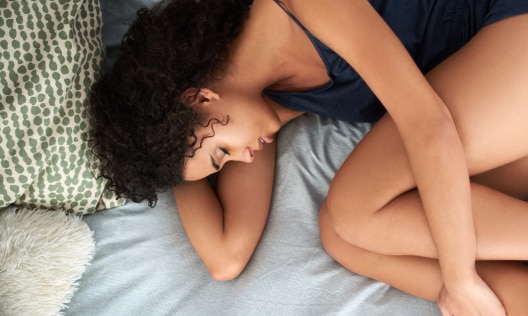Why Do I Get Hot When I Sleep? Understand Nighttime Overheating and How to Stay Cool

Waking up feeling hot and uncomfortable? Many women experience nighttime overheating, and it can be frustrating. Let’s explore the common reasons why your body overheats during sleep and explore some effective ways to stay cool and comfortable through the night.
Why does my body get so hot at night?
There are several factors that can contribute to this nighttime discomfort and understanding them can help you find the right solutions:
Hormonal changes
Hormonal fluctuations are a major culprit when it comes to feeling hot at night. For women, these fiery moments can strike during certain times of the month or life stages. Menopause is famously linked to hot flashes and night sweats thanks to changes in estrogen levels. Your menstrual cycle can also play tricks, with hormonal shifts spiking your body temperature. And let’s not forget PCOS (Polycystic Ovary Syndrome) – a condition that impacts hormone balance and can leave you feeling like you’re snoozing in a sauna.
Room conditions
The environment you sleep in plays a big role in how comfortable you feel at night. If your bedroom is too warm or lacks proper ventilation, it can cause you to overheat. Consider the temperature, humidity, and airflow in your sleeping space. Sometimes, a few simple adjustments can make a world of difference.
Bedding and sleepwear
What you sleep on, and in, can affect your body temperature. Heavy blankets, non-breathable sheets, and thick pajamas can trap heat and make you feel hot at night. Choose lightweight, breathable fabrics like cotton or linen to help regulate your body temperature.
Stress and anxiety
Believe it or not, your mental state can impact your physical comfort. Stress and anxiety can lead to increased heart rate and body temperature, making it harder to stay cool at night. Find ways to relax and unwind before bed to help ease this.
Health issues
Certain medical conditions can also cause nighttime overheating. Hyperthyroidism, for example, can increase your metabolism and body temperature. If you suspect an underlying health issue, it's always a good idea to consult with a healthcare professional.
How to stay cool and comfortable through the night
Cool down your pre-bed routine
Start your evening with cooling rituals to bring down your body temperature before sleep. Take a lukewarm shower to release trapped heat, or apply a cold compress to your wrists, neck, and temples—these pulse points help regulate temperature quickly. After your shower, swipe on SheaMoisture deodorant to keep sweat in check overnight and wake up feeling fresh.
Optimize your sleep position
Your sleep position can impact how heat disperses from your body. Sprawling out with your arms and legs spread (hello, starfish!) allows heat to escape more effectively than curling up in a ball. A cooling gel pillow can also work wonders for keeping your head—and dreams—cool.
Embrace natural cooling remedies
Try a DIY approach to nighttime cooling. A few drops of peppermint or eucalyptus essential oil on your pillowcase can create a refreshing effect. Alternatively, keep a chilled water bottle by your bed to dab your skin if you wake up feeling too warm.
Time your meals wisely
Late night meals, especially heavy or spicy meals, can rev up your metabolism and raise your internal temperature. Aim to finish dinner a couple of hours before bed and go for lighter, cooling foods like leafy greens or water-rich fruits to keep things calm and collected.
Tackle stress and anxiety before bed
Unwinding your mind is just as important as cooling your body. Create a bedtime ritual that helps you relax, like practicing deep breathing or progressive muscle relaxation. Journaling your thoughts can also help clear your mind of worries. Listening to calming music, a soothing podcast, or even a guided meditation can help lull you into a peaceful state, making it easier for you to fall asleep cool and collected.
Track hormonal patterns
If you notice consistent overheating during certain times of the month, consider tracking your cycle or consulting a healthcare provider. Hormonal insights can help you fine-tune your nighttime routine or explore options like natural supplements to stabilize fluctuations.
Feeling hot at night can be a real challenge, but understanding the reasons behind it and taking proactive steps can help you stay cool and comfortable. Your body is unique, and finding the right solutions may take some trial and error. But with a little patience and the right approach, you can enjoy restful, refreshing sleep once again.
So, the next time you find yourself asking, "Why do I get hot when I sleep?", you'll have the knowledge and tools to tackle the issue head-on. Stay cool, stay comfortable, and embrace the magic of a good night's sleep.
Dive into more self-care tips and how-to guides.
- slide 1
- slide 2
- slide 3







